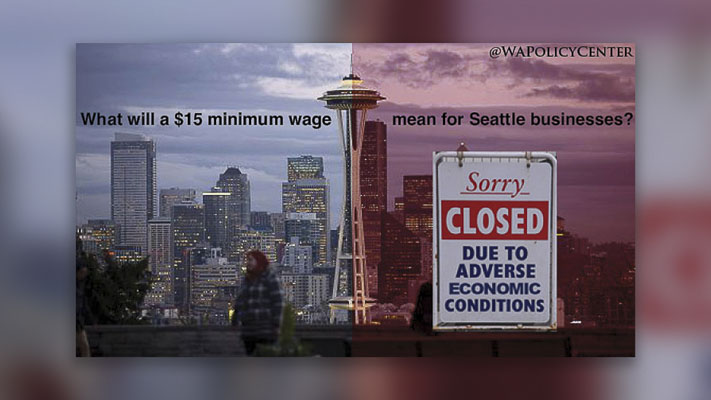
Mark Harmsworth of the Washington Policy Center discusses the harm imposed by a high minimum wage
Mark Harmsworth
Washington Policy Center
Voters in the city of Tukwila will be asked to approve an almost 20 percent hike in the minimum wage to over $17 on this November’s ballot. Following in the footsteps of the cities of Seattle and SeaTac, the Tukwila wage increase will destroy jobs, reduce available work hours, and will cause further inflation. Businesses will often relocate away from areas that have high minimum wages creating longer commutes for workers that chose to stay with the employer or elimination of the jobs completely.

Nowhere is the harm imposed by a high minimum wage demonstrated more clearly than in Seattle, where the city council has aggressively increased the minimum wage over the last few years. The rash of restaurant closures and lost jobs can be attributed, in many cases, directly to the additional fiscal cost the minimum wage increases have caused.
Now, apparently, Tukwila wants to follow Seattle’s poor example.
Seattle residents saw store closures and jobs eliminated when the Seattle City Council voted to add an additional $4 per hour during a state of emergency. The city of Bellingham had a similar initiative rejected recently when the voters voted against a labor funded initiative to add a $4 hazard pay to Bellingham workers.
A recent study by the University of Washington has shown that Seattle’s $15 minimum wage “did little to offset widening inequality”. This conclusion matches the research done across the United States and work that the Washington Policy Center has done over the last decade on the effect of artificially high, government set, minimum wage policies.
This is continuing the pattern of increasing taxes on local businesses by local councils that puts the city at a disadvantage with neighboring cities.
The Seattle Metro Chamber, states on its website that more than 210 stores and businesses have permanently closed in Seattle since the start of the pandemic, along with the loss of tens of thousands of jobs. City budget projections warned that increases to payroll would “add to business costs, possibly slow down the employment recovery, and make Seattle less attractive relative to other cities in the region.”
The obvious result of a high minimum wage is the pressure it puts on small business owners trying to make payroll. For many service industries such as restaurants, retail or hospitality, profit margins can be as low as 3 percent. Increasing minimum wage mandates wipe out that profit and can put a business into negative fiscal territory. Business owners are often forced to cut their operational costs. In other words, they are forced to lay off workers or reduce their hours.
As the University of Washington study concludes, “local minimum wage laws are not likely to substantially reduce earnings inequality”, it is obvious that government controls on wages, such as minimum wage and hazard pay have no long-term effects on workers’ overall income. The results of a high artificial minimum wage are exactly the opposite of the proponents desired result. High minimum wages reduce income and destroy jobs for those lower wage earners.
The good news is, all of this can be fixed with a change in policy and an undoing of the regressive taxes and policies that are currently in place. Washington is a beautiful place to live, our government should be working to make it affordable and attractive to businesses that want to be here.
Voters should reject the minimum wage hike this fall to allow Tukwila to compete for jobs and keep costs low.
Mark Harmsworth is the director of the Small Business Center at the Washington Policy Center.
Also read:
- POLL: Why did voters reject all three tax proposals in the April 22 special election?Clark County voters rejected all three tax measures on the April 22 special election ballot, prompting questions about trust, affordability, and communication.
- Opinion: The war on parental rightsNancy Churchill argues that Olympia lawmakers are undermining voter-approved parental rights by rewriting key legislation and silencing dissent.
- Opinion: An Earth Day Lesson – Last year’s biggest environmental victories came from free marketsTodd Myers argues that Earth Day should highlight free-market solutions and grassroots innovation as more effective tools for environmental stewardship than top-down mandates.
- Opinion: Time to limit emergency clauses and give voters a choiceTodd Myers urges the governor to remove emergency clauses from bills that appear intended to block voter input rather than address real emergencies.
- Letter: C-TRAN Board improper meeting conductCamas resident Rick Vermeers criticizes the C-TRAN Board for misusing parliamentary procedure during a controversial vote on light rail.










